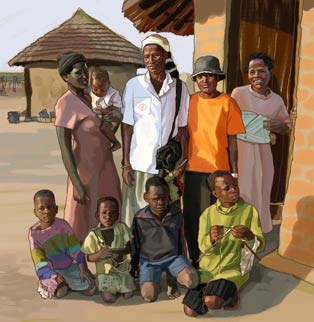
AFRICA CLOSEUP / FAITH
VISITS HER RURAL HOME
| Introducing Faith |
| Masiye Camp Explained |
| The Splashgirls |
| The Swiss Connection |
| Faith talks about AIDS |
| Faith and Volunteering |
| Ezekiel Mafusire, Masiye Camp Director |
| Faith and School |
| Faith Visits Her Rural Home |
| Faith at Home |
| About |
| Contact |
Copyright
2005 Zina Saunders All rights reserved |
Faith took a bus to visit her family in the country, about 180 kilometers from Bulawayo. She hadn't been to visit for a long time, and arrived unexpectedly.
"I hadn't told my grandmother that I was going to come, and it was really a surprise for her. They told me that they had all thought I had gone somewhere or something. Some of them thought I was with child; I heard a lot of stories of what they thought [had happened to] me!"
Faith's visit had a practical side, ""I am the oldest child and so, when my mother passed away, I was responsible for everything. But I couldn't do it at that age; I was not working and no one could do anything. My grandfather had already passed away and so it was difficult. And so when I go back, now I am supposed to put my mother's tombstone, because the graves are collapsing because of the poor soil."
Describing the family home, she says, "It's not my grandmother's home, it's a family home which was owned by my great-grandparents and everyone stays there, my aunts and cousins, etc."
Her grandmother manages to eke out a living, "She cuts grass and sells and sometimes they hire her to do field work, and stuff like that. And she does have her own field to plow."
Grass is used for roofing, "But me, I don't know how to cut the grass, I never learnt how to cut it; grass cuts your hands and your feet so much. I used to remain behind at home, doing the household work. And then I went to the city for school."
All the children attend the local council school, where they teach in Ndebele, "Because the children there understand the language better than English, even though English is the official language, this side."
Explaining how she came to be fluent in English, she says, "I fully learnt english when I was a bit older, from secondary school and through socializing with people all around. So, now I am so fluent; I don't know why, but I am."
Her family all sleep in the one room house, on bed mats rolled out for the night. The cooking is done in a shallow pit in the floor, over fire wood they collect from the ground nearby. The water is pumped from a well, and carried in buckets to the home.
Life is difficult, in the rural areas of Zimbabwe, "I was used to it, really, because I had grown up in that environment. I had never, ever imagined something better than that. It became normal to me, since that's what we could afford at home and I had never experienced a different life at all; I didn't know [what] it was like to live well, so it didn't bother me because I didn't know what I was missing out on or not missing. I had never imagined it, really."
